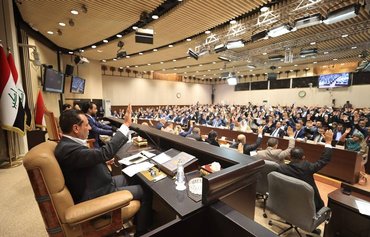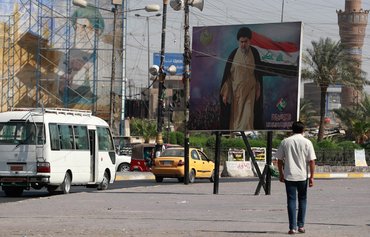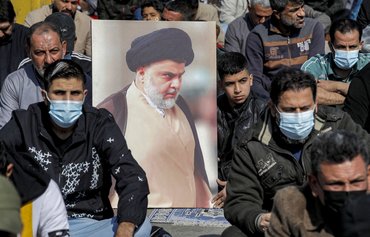Populist Iraqi cleric Muqtada al-Sadr's recent call for a restoration of the "Shia House" has sparked controversy within political circles.
Some regard it as a call to return to an era of sectarian entrenchment and factional interests, while others see it as a prelude to greater political consensus.
Al-Sadr made the call in a December 2nd post on social media platform Twitter.
"I find it in the public interest and a matter of urgency to get the Shia House in order through intensive meetings in an effort to document an ideological and political code of honour," he said.
Al-Sadr's call was not warmly received by many influential forces in the Iraqi arena, as it reflects an "outdated" trend that has been recycled using previous slogans and speeches to win the support of the masses, observers said.
It also met with scepticism, as al-Sadr often fluctuates in his positions.
Political analyst Hatem al-Falahi told Diyaruna he believes al-Sadr's call is "sectarian" in general terms "and takes us back to square one of the sectarian alignment of political blocs".
At its peak in 2005, this type of sectarian alignment came with disastrous consequences, he said, as the country plunged into a cycle of sectarian violence and security, political and economic crises.
Attempt to 'influence elections'
The purpose of the call is "to control the popular protest movement" that began more than a year ago and which al-Sadr turned against in recent months, when he called out protestors as "boys" and "jokers", al-Falahi said.
Al-Sadr's followers took their cue from him when they suppressed late November demonstrations in al-Haboubi Square in al-Nasiriyah, he said. They attacked the demonstrators, killing and wounding many and burning their tents.
Observers told Diyaruna they believe al-Sadr wants to unite his opponents and his former allies, the leaders of armed Shia blocs and factions loyal to Iran, for electoral purposes, with the goal of dominating the political scene.
Al-Falahi characterised al-Sadr's push to "put the Shia House in order" as a way to "influence" the upcoming elections and grab enough seats for his party to be able to appoint the prime minister.
But former Iraqi MP Taha al-Lahibi told Diyaruna the Sadrists' chances of influencing the prime minister appointment are very weak.
It is not likely they will achieve electoral gains, he said, as their seats in the next parliament may decline from the current 54 to less than 30, now that "the falsehood of their slogans about reform and fighting corruption have been exposed".
He said he believes this explains al-Sadr's recent declaration, which coincides with Iran's attempts to quell protests that reject its harmful influence in Iraq.
Iran also is attempting to bring Shia leaders together and forge political agreements and partnerships based on the principle of sectarian affiliation.
Sources from the IRGC's Quds Force told Al-Jarida newspaper in November that a meeting was held in Beirut under the auspices of Hizbullah leader Hassan Nasrallah, which brought together al-Sadr and head of the State of Law coalition, former premier Nuri al-Maliki.
The meeting aimed to achieve reconciliation between the two sides and strengthen the pro-Iran Shia bloc in Iraq ahead of the parliamentary elections, the report said.
Al-Lahibi said this movement "is a thing of the past and diverts from the popular trend and youth movement that today calls for building an inclusive Iraqi house that brings together all sects and affiliations and protects everyone's right".
"This means a strong and unified Iraq that maintains its sovereignty and independence, rather than allowing Iran or any other country to interfere in its internal affairs, and whose citizens enjoy stability and prosperity," he said.
'Genuine desire to heal'
According to Issam al-Faily, who teaches politics at al-Mustansiriya University, however, al-Sadr is motivated by a genuine desire to heal Iraq's divisions.
He told Diyaruna the cleric's aim is to "first reach compromise among Shia, and then to achieve the same with other factions in an effort to heal the rift ahead of the approaching elections".
"It is not a new call, with the late politician Ahmed al-Chalabi being the first to advocate for such a stance," he said.
He pointed out that there are differing schools of thought among the Shia, who follow various religious authorities and also identify as liberal or secular.
"People now want a political bloc that achieves results in their interest, regardless of its title, in which new talent works towards building a state of institutions and services," al-Faily said.

![Populist cleric Muqtada al-Sadr receives his electoral card at a voter card issuance centre in this file photo from March 5th, 2018. [Photo courtesy of Iraqi Electoral Commission]](/cnmi_di/images/2020/12/15/27406-moqtada-albayt-alshia-600_384.jpg)






